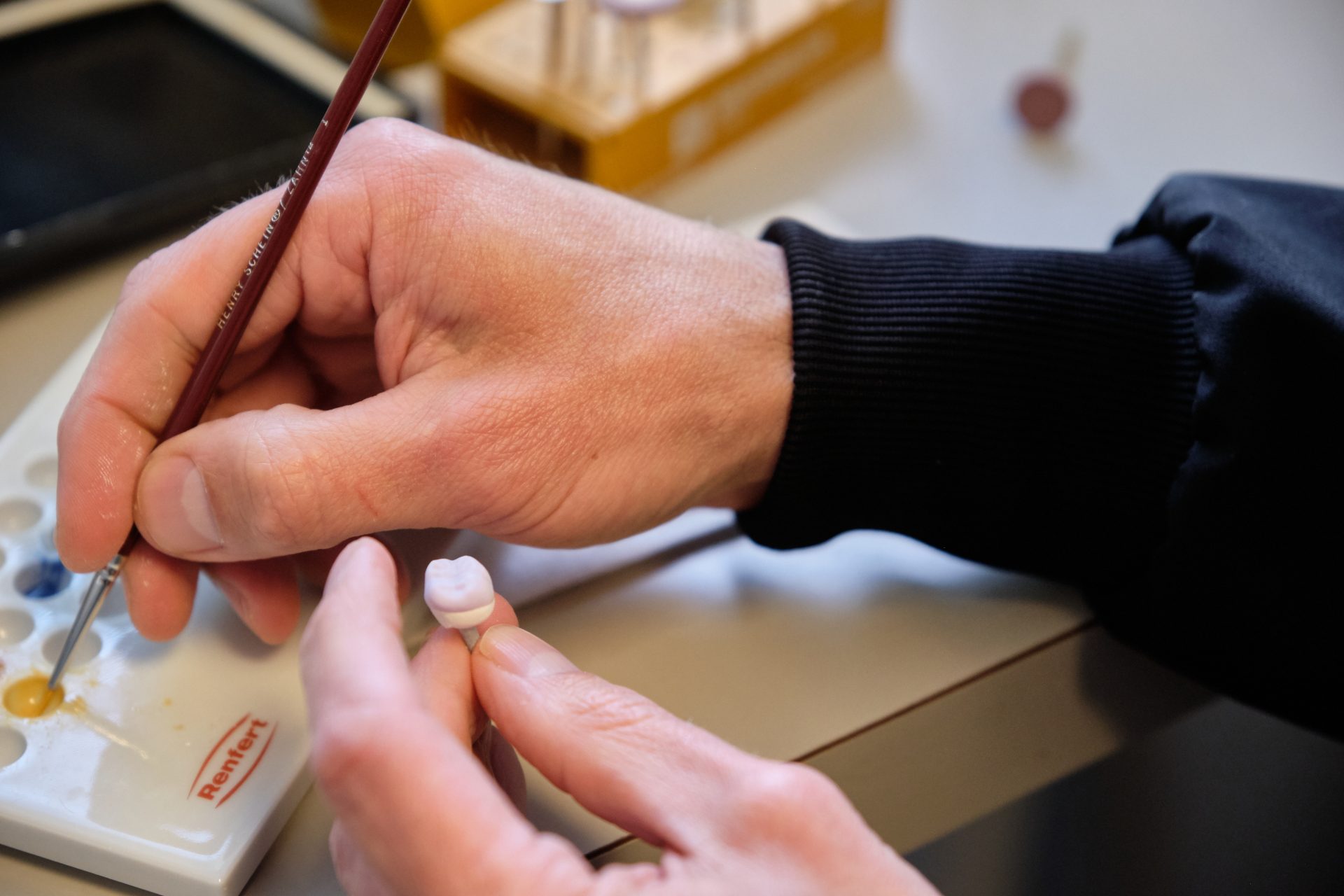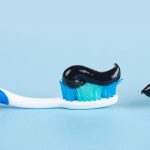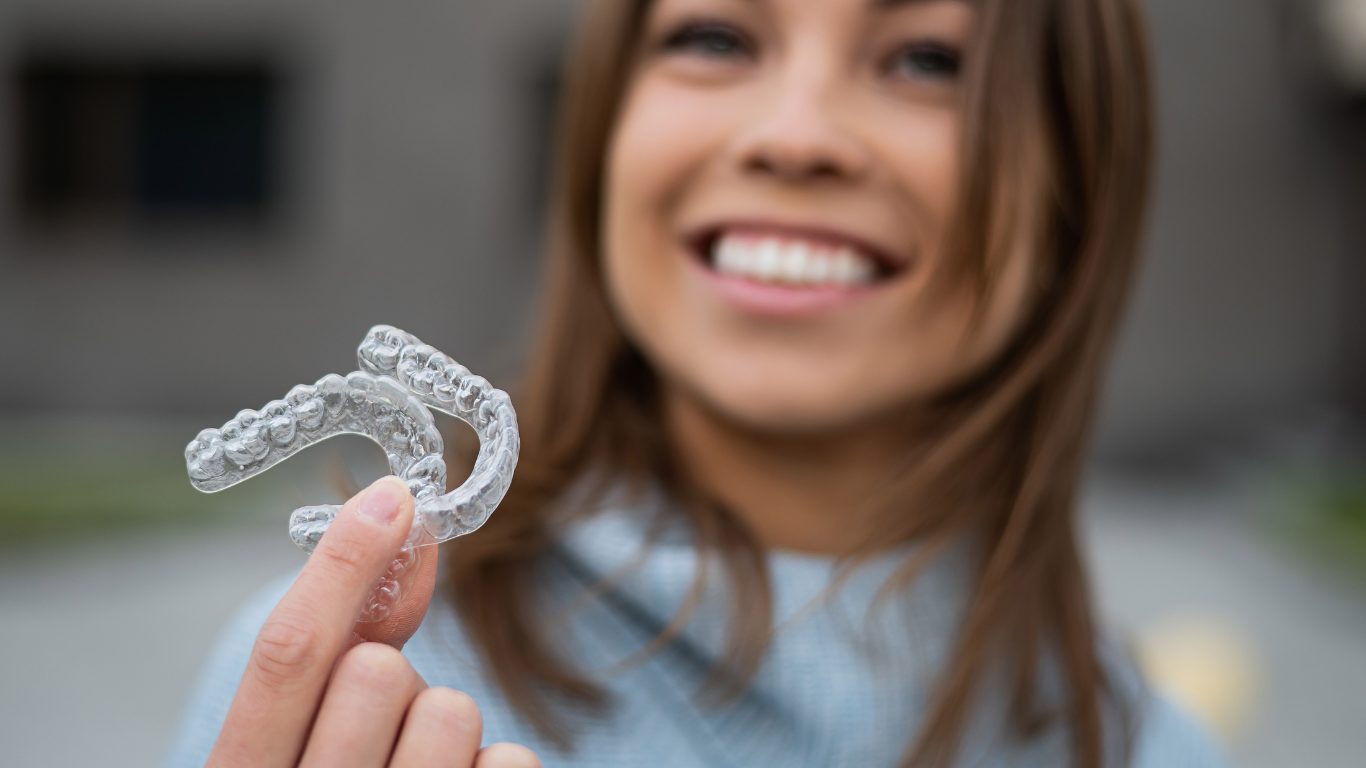
Crowns vs. Filling: Which One is Best For You?
June 30, 2023
Does Charcoal Toothpaste Whiten Teeth?
July 31, 2023Key Takeaways:
Invisalign Can Work for Teeth Grinders:
People who grind their teeth (Bruxism) can still benefit from Invisalign, as it helps align teeth and may reduce grinding by improving bite alignment.
Aligners Provide Protection:
Invisalign aligners can act as a protective barrier for tooth enamel, absorbing some of the pressure from grinding.
Potential Risks:
The need to wear aligners for 20-22 hours a day may interfere with using a night guard, and grinding can cause additional wear on the aligners.
If you have crooked or misaligned teeth and grind your teeth, you may wonder, “Can I get Invisalign if I grind my teeth?”
If you are asking this question, know that you are not alone. Many adults who want to straighten their teeth prefer the barely-there look of Invisalign. Reported statistics vary on how common tooth grinding is; many people don’t even know they do it. Considering how many people have crooked or misaligned teeth, you know you are not the only one with these concerns.
According to Scientific American, nine out of ten people have teeth that are “at least slightly misaligned,” likely due to the human jaw shrinking over the centuries. Many of these people only have slight misalignment, so they may not opt for traditional braces. But Invisalign is a game-changer!
Invisalign is a popular alternative to traditional braces since it is discreet and convenient. However, it’s essential to understand whether Invisalign is appropriate for someone who grinds their teeth or clenches their jaw.
The good news is Yes, most likely, you may still benefit from Invisalign. Of course, each case is different, so your best bet is to schedule a consultation with a dentist. This article isn’t a substitute for dental care. It simply explores the potential benefits and risks of Invisalign for people who grind their teeth. We hope to help you make an informed decision about your dental health.
About Tooth Grinding and Its Relationship With Tooth Misalignment
Tooth grinding, also known as Bruxism, is kind of mysterious. Often people don’t even know they do it until their dentist comments about noticing signs of it. Some people grind their teeth while awake, while others do it while sleeping, known as sleep bruxism.
Watch for some of the top signs that you may grind your teeth:
- Teeth showing signs of wear and tear: Flat or worn-down teeth, cracked, broken, chipped teeth, lost fillings, or other unexplained tooth damage can indicate chronic teeth grinding.
- Headaches or facial pain when you wake up: Waking up with headaches, jaw pain, or a tired feeling in your facial muscles can be a sign of tooth grinding during sleep.
- Disrupted sleep: Bruxism can result in disrupted sleep for both you and your sleeping partner. You might wake up feeling tired and fatigued, or your face may feel tired, and you may have a headache.
- Signs you bite the inside of your mouth: You may have scars or minor wounds inside your cheeks or even on your tongue.
Bruxism often appears to have a stress element meaning people tend to clench their jaw more when experiencing stress. The Washington Post reports an anecdotal observation from some dentists that tooth grinding may have even increased among adults due to stress from the COVID-19 pandemic.
In addition to stress, sometimes people don’t realize that Bruxism also may result from poor dental alignment, or at least the misalignment can worsen the clenching and grinding. In this case, realigning the teeth can help reduce the severity of the grinding or even help make it stop.
Benefits of Invisalign for People With Bruxism
Invisalign offers several benefits for teeth grinders who are looking to straighten their teeth:
- Removability: Invisalign aligners are removable, allowing you to take them out during meals and while brushing and flossing your teeth. Maintaining your oral hygiene is easier, which is crucial for teeth grinders who may already have increased risks of dental issues.
- Comfort: Invisalign aligners are made of smooth, BPA-free plastic, which can be more comfortable than traditional metal braces. This may help reduce irritation and discomfort that could potentially exacerbate teeth-grinding habits.
- Protection for tooth enamel: The removable aligners may also provide a little protection for your teeth and enamel, whether you grind while you sleep or from stress during the day. The plastic aligner tray absorbs some of the pressure, kind of like a thin mouth guard.
- Discreet appearance: Invisalign’s clear aligners are virtually invisible, making them a more aesthetically pleasing option for adults and teens who may feel self-conscious about wearing traditional braces.
- Customized treatment: Invisalign treatment plans are tailored to each individual’s needs, allowing dental professionals to address any specific alignment issues that may contribute to teeth grinding, such as misaligned bites.
- Reduced risk of dental emergencies: Invisalign aligners have fewer components than traditional braces, which means there’s a lower chance of dental emergencies like broken wires or brackets that could cause discomfort and trigger teeth grinding.
- Potential future grinding prevention: Invisalign might help prevent future teeth grinding since misaligned teeth can contribute to the problem. Realigning your teeth with Invisalign may also make it easier to find a night guard that fits well if your Bruxism has another cause.
Risks of Invisalign for People With Bruxism
The main downside to using Invisalign if you have Bruxism is the fact you need to wear the aligners for 20-22 hours, meaning you probably can’t also wear your current mouth guard while sleeping. If you have a custom-made mouth guard, the fit will change as your teeth shift position toward a healthier alignment.
Grinding your teeth will also cause extra wear and tear on your aligners. Fortunately, the aligners change frequently as your teeth move. It’s unlikely that grinding will damage them too much before you are ready to move on to the next set of trays.
Your Next Step to Straighter Teeth for Charlotte, NC Residents
Invisalign treatment is a viable solution for many people with Bruxism who desire a straighter, more confident smile. Not only can Invisalign help correct misaligned teeth, but it may also protect against the damaging effects of teeth grinding. As you consider your options for improving your smile, don’t let Bruxism hold you back from exploring the benefits of Invisalign.
Take the first step towards a healthier, more radiant smile. Schedule a consultation with the experienced team at Southview Dentistry. They will assess your unique dental needs and determine if Invisalign is the right choice for you. Don’t wait to invest in your oral health and self-confidence – contact Southview Dentistry today!




